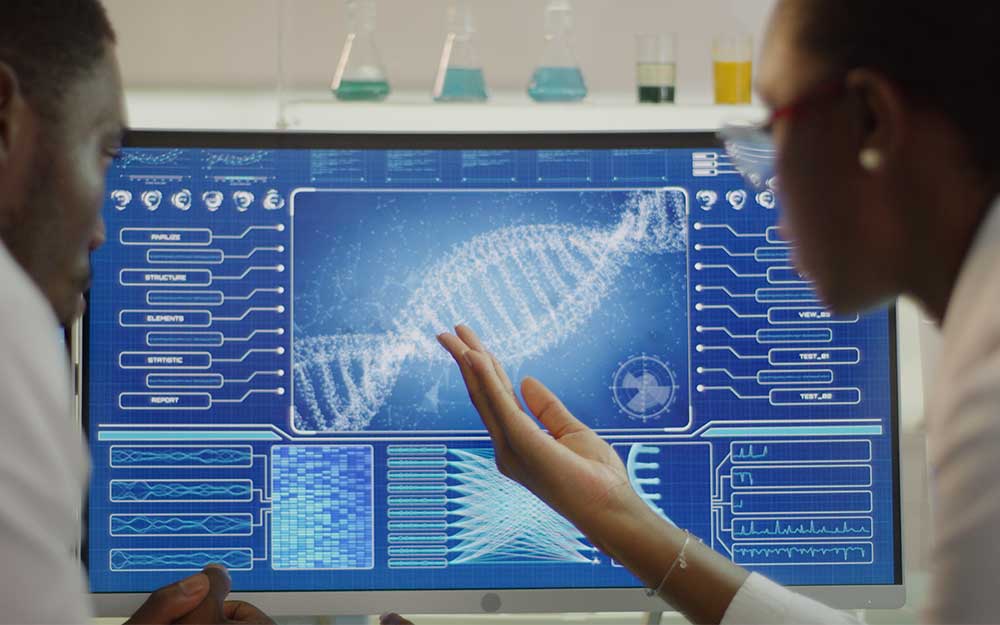Living with chronic disease is costly — physically, financially, and mentally — for the person suffering in addition to their families and caregivers.
Recently, Sheldon Garrison, PhD, research scientist, shared the work being done at the Rogers Research Center at the National Organization for Rare Disorders Summit.
“We are trying to reimagine how we approach rare genetic diseases in the mental health space,” says Dr. Garrison. “We are interested in rare genetic diseases that may have mental health and addiction symptoms. By that I mean the patient clinically appears like someone with a primary mental health condition, such as depression, anxiety, and ADHD, but they are symptoms of the rare disease itself. Moreover, they may appear months or years before other symptoms of the rare disease.”
Medications and therapeutics that are typically prescribed to patients presenting with mental health symptoms may not work for someone with an undiagnosed rare genetic disease.
“Patients may be labeled as treatment or medication resistant,” he explains. “The goal is to improve patient outcomes by ensuring that they’re given treatments that align with the biology of their condition.”
While rare diseases affect less than 10% of the population, they total nearly half of all of healthcare costs worldwide. Besides the disproportionate financial impact, Dr. Garrison says another major challenge for people with rare diseases is what’s called diagnostic delay.
“From the onset of symptoms to the time where there’s a definitive diagnosis, industry average is between six to eight years,” he says. “That’s an extremely long time to not have an accurate diagnosis. It would be highly unusual for medical providers in any medical field to suspect a rare condition at the onset of symptoms. They also have limited tools to help identify those rare genetic conditions, so it’s almost an impossible ask.”
Dr. Garrison says it’s highly likely that within Rogers, a certain percentage of our patients may have a rare genetic condition.
“I think that one way for the Research Center to contribute to our treatment teams is by using genetics to provide them with a more complete picture of certain patients, so that they can use the information as part of their clinical decision making,” he says.
Rogers’ scientists have spent the past two years narrowing a list that started with about 7,000 conditions down to about 100 rare genetic diseases that present with mental health symptoms.
“An example is the adult-onset subtype of Niemann-Pick disease, Type C1 disease,” he says. “Patients may reach their 20s or 30s when they start to experience classic symptoms of schizophrenia. They’re given the standard treatment for schizophrenia, but are soon labeled as treatment-resistant when they fail to respond. It is often not until years or decades later that the neurological symptoms appear. The patient gets genetically tested and is finally diagnosed with the correct condition. Only then does the patient receive the condition-specific treatments that leads to a resolution of symptoms. It’s a game changer for those patients.”
Rogers’ scientists are working on how to identify patients that seek treatment with us and have a rare genetic disorder.
“We’re thinking that in the future, patients who have met a certain set of criteria, which may include multiple medication failures, would be provided with genetic testing to screen for these rare diseases,” he says.
In addition to working on how to screen patients, Rogers’ scientists are also creating a resource center for our clinicians.
“Information on many of these conditions is quite diffuse and time consuming to curate,” he says. “We’re gathering information and centralizing it. We’re also working closely with different patient advocacy groups and foundations, which is critical because they tend to house information that is not yet in the public domain. They’ve been a tremendous asset in our journey.”
Dr. Garrison is passionate about how the work at the Research Center will change lives.
“Helping to provide a diagnosis for even one of our patients who is seeking help can have a profound impact,” he says. “Shortening the time of the diagnostic delay is the piece that we’re really trying to do our best to solve. I think we owe it to our patients.”


